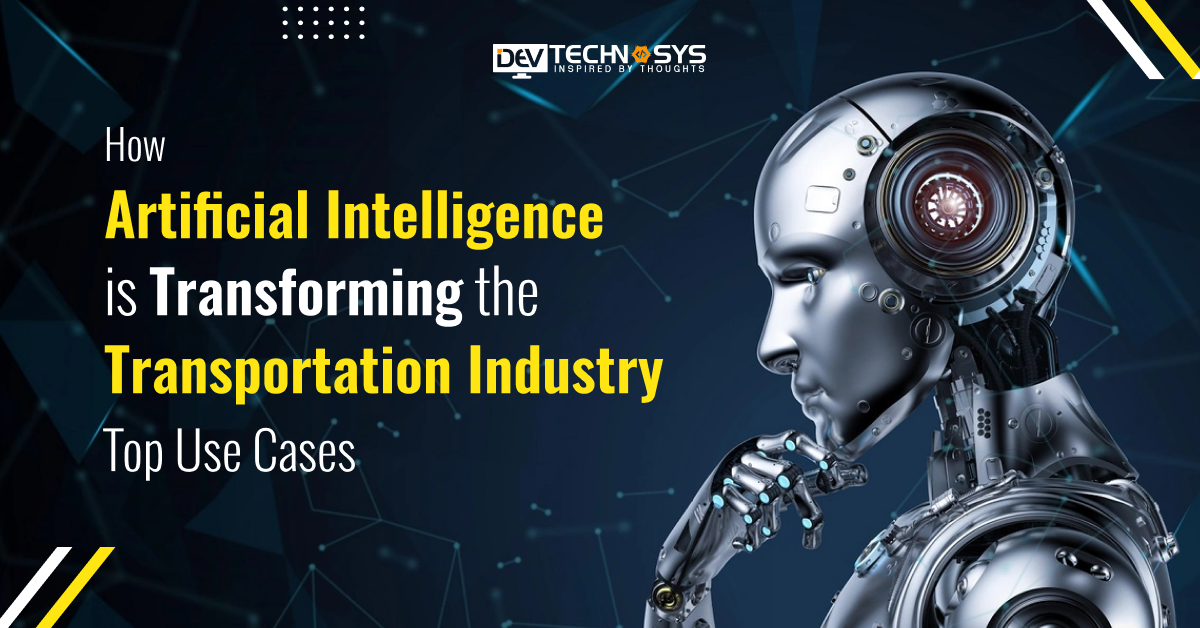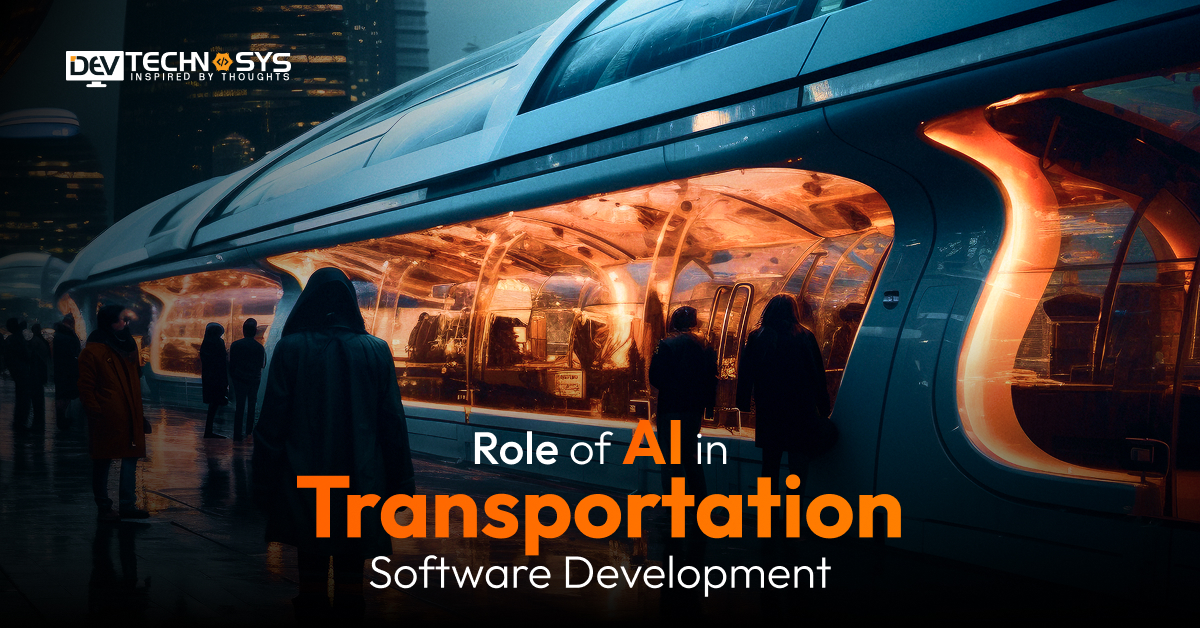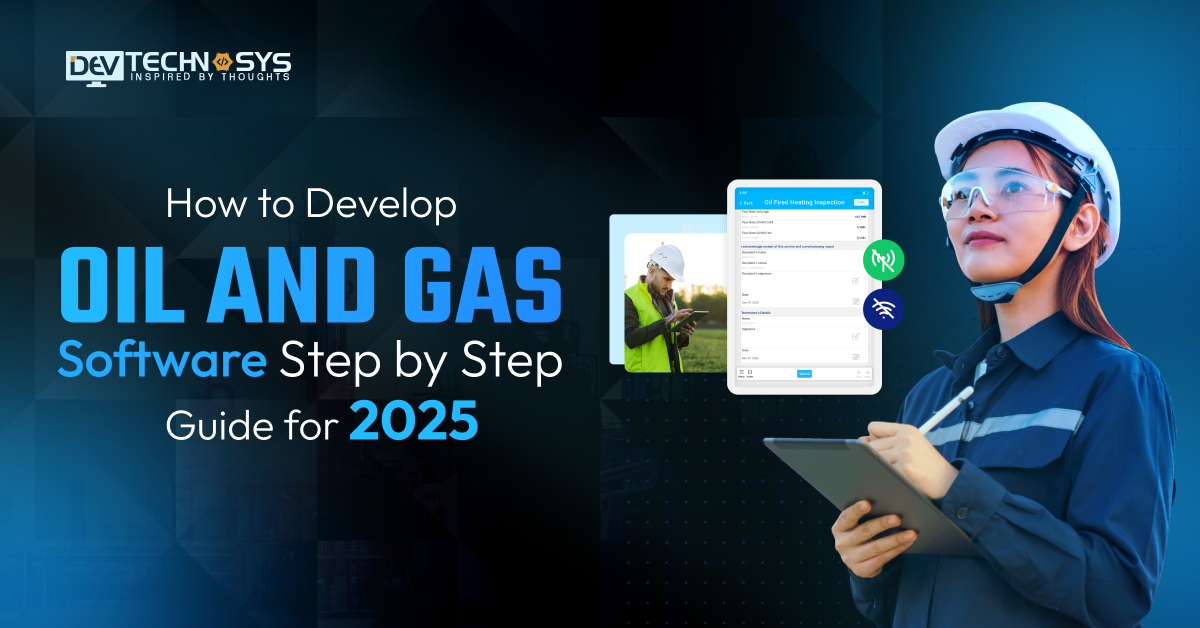“Power your logistics business with AI.”
Whether you want to travel from one place to another, looking to shift your luggage, or to deliver something, the transportation industry has a major role in the life of common people. The use of advanced technologies like AI in transportation and logistics has made all these tasks easier and smooth.
People are experiencing the impact of Artificial Intelligence in transportation systems in their real life through various interactive elements. Additionally, it is also benefiting business investors to generate a profitable income by accessing AI services.
So, to implement cost-effective AI solutions for transport, you need to know different aspects like use cases and challenges in this domain. Let’s get started by observing the below stats first.
Market Stats of the Logistics Industry
- Expected to be $179.41 Billion in 2029, the logistics expenses of the Transportation & Logistics industry could show the extent of market growth possible.
- With a projected annual growth rate of 4.86% CAGR between 2025 and 2029, logistics expenses are expected to exhibit an increase of $179.41 Billion by 2029.
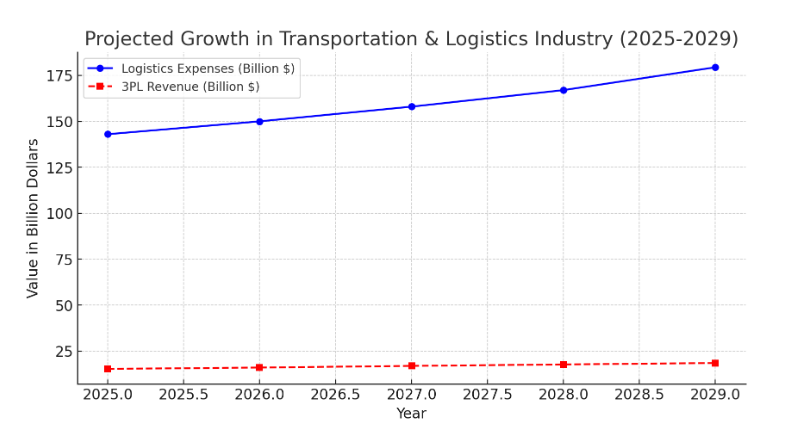
- In 2025, United Arab Emirates’ container port traffic is expected to be 19.81 Million.
- By 2025, revenue in the Third-Party Logistics industry is expected to be $15.28 Billion.
- With an annual growth rate of 4.86% CAGR, revenue is expected to rise to $18.48 Billion by 2029, therefore influencing the projected market volume.
What is AI in Transportation?
Use of AI in transportation helps to maximize traffic control, increase safety, and streamline mobility and logistics with transportation. Real-time data analysis by AI-driven systems automates tasks, supports decision-making, and helps to lower congestion. Additionally, it is important to target mobile app development solutions to prevent accidents, and improve general transportation infrastructure.
1. Traffic Management Optimization – By dynamically changing traffic flow, AI-powered traffic systems evaluate real-time road conditions, manage signals, and help to lower congestion.
2. Autonomous Vehicles – Through sensor data processing and real-time driving decisions, artificial intelligence lets self-driving vehicles, trucks, and drones safely negotiate highways.
3. Predictive Maintenance – By means of vehicle and infrastructure data analysis, artificial intelligence forecasts maintenance requirements, therefore reducing failures and enhancing operational effectiveness.
4. Smart Route Planning – For companies and commuters, AI-powered navigation systems and logistics help to maximize delivery paths, hence lowering travel time and fuel usage.
5. Enhanced Passenger Experience – Travel experiences are tailored by artificial intelligence chatbots, virtual assistants, and predictive analytics personalizing real-time updates, recommendations, and automation.
Why Choose AI for the Transportation Industry?
By raising safety, lowering costs, and increasing efficiency, artificial intelligence in transportation sector has been revolutionized. Real-time data analysis, predictive maintenance, and autonomous systems let artificial intelligence and transportation maximize passenger experience.
Additionally, it is possible with the use of transportation software development services. To know How AI is transforming transportation it is important to study the benefits and role of other technologies.
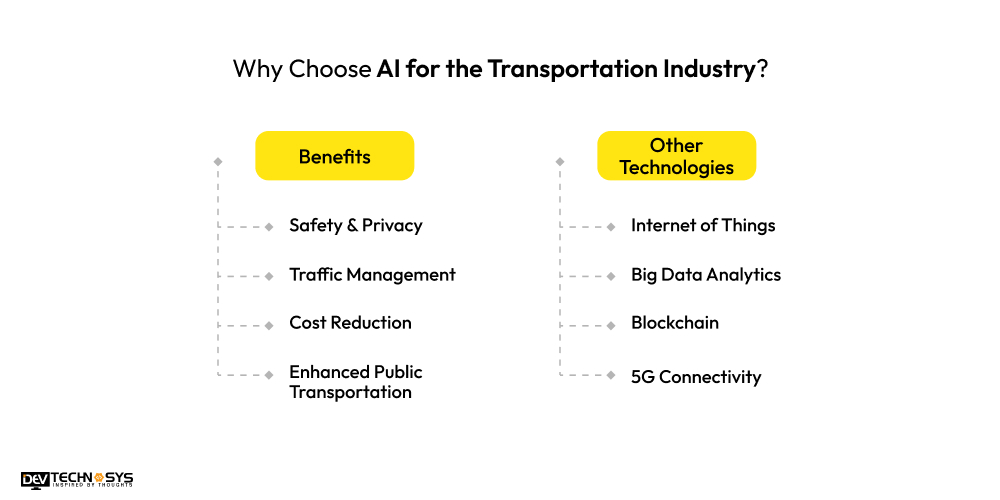
1. Benefits
- Safety & Privacy
By seeing risks, projecting collisions, and helping drivers with real-time alerts and automation, AI-powered solutions help to lower accidents. Further reducing human mistakes and improving road safety is self-driving technology.
- Traffic Management
By dynamically adjusting signals based on camera and sensor data, artificial intelligence-based traffic control systems help to lower congestion. By contacting an Artificial Intelligence development company you can enhance traffic flow in metropolitan settings.
- Cost Reduction
It is one of the major benefits of AI in transportation that optimize fuel use, enhance vehicle maintenance, and simplify logistical operations. This increases efficiency and profitability as AI helps transportation businesses to minimize expenses.
- Enhanced Public Transportation
Passengers can demand prediction, route optimization, and real-time travel updates. It ensures a seamless commuting experience as the use of AI enhances public transportation.
2. Other Technologies
- Internet of Things
By gathering and sending real-time data from road sensors, traffic signals, and automobiles, IoT devices help to enable predictive maintenance and smarter traffic control.
- Big Data Analytics
Analyzed are large databases including GPS, traffic cameras, and transportation networks in order to maximize paths, enhance safety precautions, and project demand.
- Blockchain
Businesses can hire dedicated mobile app developers to guarantee openness in supply chain logistics, digital payments, and vehicle data management. Additionally, this ensures transparency, security, and distributed technology to lower fraud and inefficiencies.
- 5G Connectivity
Real-time vehicle connectivity made possible by ultra-fast 5G networks improves autonomous driving, smart traffic systems, ride-sharing experiences, and driver safety.
Top Use Cases of AI in the Transportation Industry
Through improvement of efficiency, safety, and automation, AI applications in public transportation are changing this industry. Contacting a mobile app development company is beneficial to implement AI-driven technologies that are changing global transportation of commodities for people.
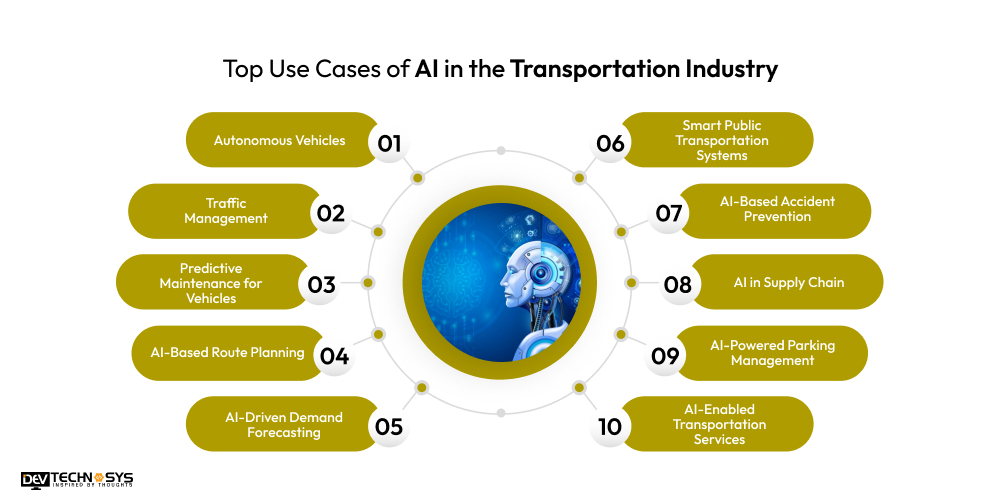
1. Autonomous Vehicles
To safely negotiate roadways, self-driving cars and trucks employ AI-powered sensors and algorithms. These vehicles make driving decisions, traffic pattern predictions, and obstacle detection using real-time data analysis of their surroundings. Using AI in transportation helps to lower fuel use, traffic congestion, and accident rates.
Technology Used: Machine Learning, Computer Vision, LiDAR Sensors
Impact: Reduces human errors, enhances road safety, and improves fuel efficiency.
2. Traffic Management
Traffic management systems powered by artificial intelligence examine road conditions, track traffic flow, and signal optimization. To use AI with existing systems you can implement custom app development services for creating smart traffic signals that change in real-time, so it lessens jams and carbon emissions.
Technology Used: AI-powered Traffic Sensors, IoT, Predictive Analytics
Impact: Minimizes congestion, reduces travel time, and enhances urban mobility.
3. Predictive Maintenance for Vehicles
Using artificial intelligence and transportation data, for finding trends that help to forecast problems before they start. Additionally, it is profitable to approach an Android app development company for using predictive analytics that helps airlines and rail networks. So, it could maintain aircraft, trains, and roads effectively, preventing expensive breakdowns and enhancing dependability.
Technology Used: IoT Sensors, Machine Learning Algorithms, Data Analytics
Impact: Lowers maintenance costs, reduces downtime, and increases safety.
4. AI-Based Route Planning
Different AI-based route optimization solutions enable ride-sharing companies and logistics firms to identify the fastest and most economical paths. Real-time traffic, weather, and road condition data let artificial intelligence automatically redirect cars, so reducing delays and increasing efficiency.
Technology Used: GPS, Deep Learning, Big Data Analytics
Impact: Improves delivery times, reduces fuel consumption, and enhances logistics efficiency.
5. AI-Driven Demand Forecasting
To forecast public transportation, airlines, and ride-hailing services’ travel demand, artificial intelligence examines both past and current data. So, businesses should hire Artificial Intelligence developers to guarantee effective use of resources. Additionally, it will help to maximize fleet allocation and pricing policies, therefore lowering running expenses.
Technology Used: Neural Networks, Data Mining, Cloud Computing
Impact: Enhances fleet management, reduces costs, and improves customer satisfaction.
6. Smart Public Transportation Systems
By continuously changing plans and assessing demand, Smart transportation with AI maximizes public transit. By lowering wait times and raising service availability, it supports ticketing systems, automata of passenger information systems, and efficiency enhancement. A transportation app like Moovit is the best example of this use case.
Technology Used: AI Chatbots, Predictive Analysis, Automated Scheduling
Impact: Enhances passenger experience, improves scheduling, and reduces delays.
7. AI-Based Accident Prevention
Dashcams and driver monitoring systems driven by artificial intelligence spot tiredness, distractions, and careless driving. These technologies guarantee safer roadways for vehicles and pedestrians by means of real-time alarms meant to avert mishaps.
Technology Used: AI Dashcams, Real-time Monitoring, Computer Vision
Impact: Decreases road accidents, improves driver behavior, and enhances road safety.
8. AI in Supply Chain
AI-driven logistics management raises delivery accuracy, automates warehouse operations, and tracks inventory betterment. Models of machine learning examine supply chain interruptions and provide recommendations on ways to increase effectiveness and lower costs. For logistics support you can consult AI services with a hybrid app development company in UAE.
Technology Used: AI-driven Robotics, Automated Warehouses, IoT Tracking
Impact: Optimizes warehouse operations, reduces shipment delays, and improves supply chain efficiency.
9. AI-Powered Parking Management
Using artificial intelligence, smart parking solutions advise vehicles in real-time, identify empty parking spaces, and automatically pay for them. Parking systems driven by artificial intelligence are used in cities and businesses to improve user experience and ease traffic. Additionally, you can search for different custom software companies in Abu Dhabi to manage parking services.
Technology Used: IoT Sensors, Image Recognition, Automated Payment Systems
Impact: Reduces time spent searching for parking, minimizes congestion, and optimizes space usage.
10. AI-Enabled Transportation Services
Depending on user preferences, artificial intelligence in transport tailors ride-sharing and public transit experiences. AI-powered apps provide best ride options, pricing models, and route choices for a flawless experience by means of data on travel trends and user behavior.
Technology Used: AI Chatbots, Recommendation Engines, Data Analytics
Impact: Improves customer satisfaction, boosts efficiency, and enhances user engagement.
Major Challenges and Solutions of Using AI With Transportation
Though its application presents major difficulties including safety, data privacy, and expensive prices, artificial intelligence is revolutionizing transportation. Six main obstacles with their remedies for applying artificial intelligence in transportation are listed below.
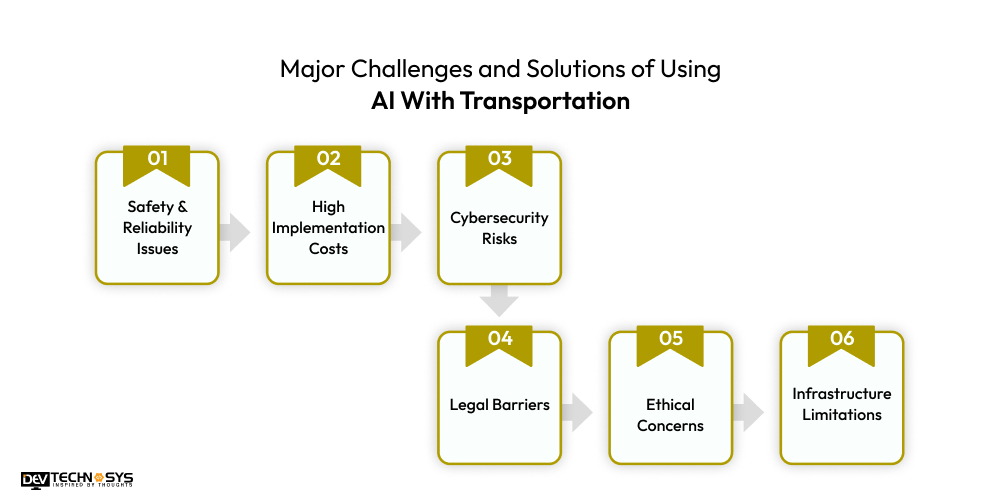
1. Safety & Reliability Issues
Challenge: Though they currently suffer with erratic road conditions and decision-making mistakes, AI-driven transportation solutions including driverless cars demand great accuracy.
Solution: Reliability can be raised by means of ongoing testing, practical simulations, and integration of artificial intelligence with real-time data sensors. Training AI algorithms on various datasets will help them to improve decision-making in challenging situations.
2. High Implementation Costs
Challenge: Adoption of developing AI-powered transportation systems is challenging for small businesses. The use of advanced hardware, software, and infrastructure demand a high software development cost.
Solution: Funding and subsidies can be given by both governments and commercial investors. To cut first costs, businesses can potentially begin with AI-driven optimizations before going to complete automation.
3. Cybersecurity Risks
Challenge: Large volumes of user data used in artificial intelligence in transportation run the danger of hacks, data leaks, and personal information being used improperly.
Solution: Strong encryption, blockchain-based data storage, and regulatory compliance including GDPR can help guard user information and stop cyberattacks.
4. Legal Barriers
Challenge: Particularly driverless cars, AI-powered transportation challenges unclear legal frameworks, liability questions, and uneven worldwide rules. Additionally, it can affect your access over custom software development solutions to implement AI with existing systems.
Solution: Clear policies must be developed by governments working with technology businesses. Standardized worldwide rules and artificial intelligence ethical guidelines help to guarantee responsible and legal application.
5. Ethical Concerns
Challenge: Especially in traffic law enforcement and automated vehicle operations, AI systems can inherit prejudices from training data and result in unjust or dangerous choices.
Solution: Regular audits, diverse and inclusive training datasets, and explainable artificial intelligence (XAI) approaches can help to lower prejudices and enhance justice in AI-driven decision-making.
6. Infrastructure Limitations
Challenge: Many cities and underdeveloped areas lack the smart infrastructure required for AI-driven transportation that is, 5G connection, IoT sensors, and smart traffic systems.
Solution: Smart infrastructure are IoT-powered road networks, enhanced connectivity, and AI-integrated public transportation solutions. A transportation software development company may help you to get investments from governments and commercial organizations.
Future of AI in Transportation Industry
Use of automation, efficiency, and sustainability, has transformed the implementation of artificial intelligence in transportation sector. Predictive maintenance, smart traffic control, and self-driving cars will all become the standard as artificial intelligence develops. Five future scopes of artificial intelligence in transportation are below.
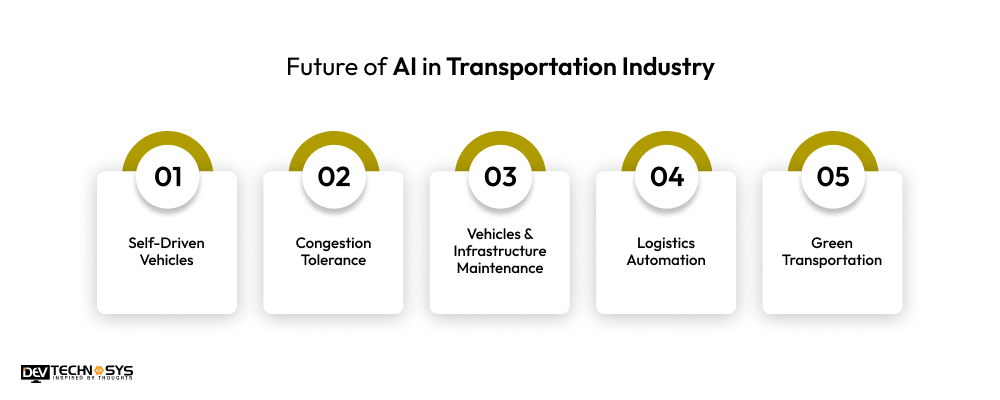
1. Self-Driven Vehicles
Trucks and self-driving cars are predicted to rule highways, therefore lowering human error and increasing road safety. LiDAR, sensors, and enhanced machine learning will let artificial intelligence improve real-time decision-making. Modern contactless services will come from autonomous taxis and delivery robots. Their general acceptance will depend mostly on the cost of AI in transport.
2. Congestion Tolerance
Real-time traffic flow management in artificial intelligence will be vital in order to lower congestion and trip times. Dynamic route adjustments depending on live data will be made through iOS app development services that involve smart traffic signals and AI-driven guidance. City planning driven by artificial intelligence will improve road systems to suit rising populations.
3. Vehicles & Infrastructure Maintenance
Predictive analytics driven by artificial intelligence will transform car maintenance and stop breakdowns before they start. Vehicles and road infrastructure’s sensors will track wear and tear, warn authorities about required repairs. This will lower maintenance costs, extend vehicle lifetime, and increase safety. AI will also maximize fleet management, hence reducing transport firms’ downtime.
4. Logistics Automation
Drone deliveries, warehouse automation, and AI-powered route optimizing will help the logistics sector. So, you can contact a software development company that uses AI to simplify supply chains, forecast demand, and enhance inventory control. Robots driven by artificial intelligence and automated goods systems will improve warehouse effectiveness.
5. Green Transportation
By encouraging electric and hydrogen-powered vehicles and resting energy use, artificial intelligence will help to provide environmentally friendly transportation options. Smart artificial intelligence systems will examine emissions statistics and propose changes for environmentally friendly mobility. Public transportation systems including artificial intelligence will promote shared mobility.
Final Thoughts!!
By using AI in transportation, many businesses are generating huge revenue and expanding their domain by acquiring different industries. So, it is important to understand a few basic points before starting a new business.
- AI solutions for transport should be applicable at low cost.
- Implementation of transportation software development services can be performed by highly qualified mobile app developers.
- To use AI for smart mobility you need to first make a prototype to identify features and required tools.
- Businesses must execute targeted monetization to generate revenue and obtain growth.
- You should process AI for ride-sharing apps helping people to get notified services.
The above discussed points make the core of the development process. So, you need to identify your requirements and budget to start precisely and at the right time.
FAQs
1. How is AI in Transportation Improving Fuel Efficiency?
By examining traffic patterns, driving behavior, and vehicle performance, artificial intelligence maximizes fuel economy. In order to cut fuel waste, AI-powered systems in trucks, vehicles, and aircraft change acceleration, braking, and speed.
2. Can AI Help Reduce Traffic Congestion in Urban Areas?
Indeed, by assessing real-time road conditions and traffic signal optimization, artificial intelligence is absolutely vital in traffic management. Smart traffic systems driven by artificial intelligence change light time depending on traffic congestion, therefore enhancing vehicle flow.
3. How is AI Used in Railway Transportation?
By means of maintenance needs prediction, train timetable optimization, and passenger safety assurance, artificial intelligence improves railway systems. To prevent mechanical problems, machine learning systems examine data from sensors on engines and rail lines.
4. How Does AI Contribute to Accident Prevention?
Using real-time data from sensors, cameras, and GPS to identify possible threats, artificial intelligence stops mishaps. Alerting drivers of lane changes, pedestrians, and abrupt hazards, driver assistance systems Autonomous cars driven by AI also make split second choices to prevent crashes which improve road safety.
5. What Role Does AI in Transportation Enhance Maritime Systems?
In marine transportation, artificial intelligence maximizes cargo tracking, fuels efficiency, and shipping routes. Predictive maintenance driven by artificial intelligence stops ship mechanical breakdowns. Furthermore under development are autonomous ships, thus less human navigation is needed.
6. How is AI Transforming Air Travel and Aviation?
AI improves passenger experience, automates air traffic control, and optimizes flight paths, therefore enhancing aviation. Predictive maintenance used by airlines helps to avoid technical problems. Customer support chatbots driven by artificial intelligence also help with flight tickets, delays, baggage monitoring.



